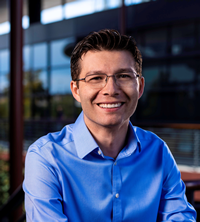Awardee of 2021 Joseph Altman Award in Developmental
Neuroscience, Sergiu P. Pasca
Sergiu P. Pasca, MD
Stanford University
Associate Professor of Psychiatry and Behavioral Sciences & The Bonnie Uytengsu and Family Director of Stanford Brain Organogenesis
Stanford University
Associate Professor of Psychiatry and Behavioral Sciences & The Bonnie Uytengsu and Family Director of Stanford Brain Organogenesis
I am delighted and honored to receive the 2021 Altman Award in Developmental Neuroscience. I am humbled to be selected by the committee and thrilled to join such an incredible group of previous awardees. I am thankful for my talented group of students and supportive mentors and colleagues at Stanford.
This prize is particularly meaningful to me as Drs Altman and Bayer’s work has been highly influential during my training; in fact, their spectacular atlases are still an important component of my Stanford class on neural development.
My laboratory seeks to understand the rules that govern the molecular and cellular steps underlying the assembly of the human brain and the molecular mechanisms that lead to disease. Towards this, we are developing bottom-up approaches to create and assemble, from multi-cellular components, human neural circuits.
As a medical student in Romania, I used biochemistry and genetics to explore gene-environment interactions in patients with autism spectrum disorder. The challenges associated with studying neural tissue from patients led me to recognize the promise of cellular reprogramming and prompted me to pursue basic science approaches to disease. As a postdoctoral fellow following my MD, I developed some of the early models of disease using stem cell-derived neurons and used them to uncover developmental and electrophysiological effects of specific mutations.
In an effort to gain access to previously inaccessible aspects of human brain development, my laboratory at Stanford has introduced the use of instructive signals for deriving self-organizing 3D cell ensembles called neural spheroids or brain region-specific organoids. These cultures resemble specific domains of the nervous system, such as the human cerebral cortex, contain synaptically connected neurons and astrocytes and can be reliably derived across lines and experiments. Moreover, when maintained in vitro for years, they recapitulate an intrinsic program of maturation that progresses into postnatal stages. Over the last period, we systematically applied these methods to gain mechanistic insights into environmental and genetic disorders of the brain, such as Timothy syndrome, 22q11.2 deletion syndrome, Phelan McDermind and others.
To capture complex cell–cell interactions in neural development, we also introduced a system to integrate 3D organoids in functional preparations we named assembloids. As devised by us, assembloid generation is modular, relying on producing brain region-specific organoids that are subsequently fused in 3D to allow formation of neural circuits. For instance, we derived dorsal and ventral forebrain organoids that can be fused to study cortical interneuron migration. More recently, we also created cortico-spinal-muscle assembloids and cortico-striatal assembloids to model motor and forebrain pathways, and we discovered remarkable self-assembly capabilities of these 3D cultures to form functional human circuits.
I believe science is a community effort, and accordingly, we have been advancing the field by openly and broadly sharing our technologies with hundreds of laboratories around the world, and organizing training courses.
This is such a thrilling time for human neurobiology, and I am excited to continue to contribute towards building a new biological understanding of neuropsychiatric disease.

Pasca lab website:
www.pascalab.org
Twitter: @PascaStanford
Twitter: @PascaStanford
Work experience:
- 2009-2013:
- Postdoctoral fellow in Neurobiology, Stanford University, USA
- 2014-2020:
- Assistant Professor, Stanford University, USA
- 2020–:
- Associate Professor (with tenure), Stanford University, USA
Educational background:
- 2007:
- Medical Doctor, Romania

Sergiu P. Pasca, MD





